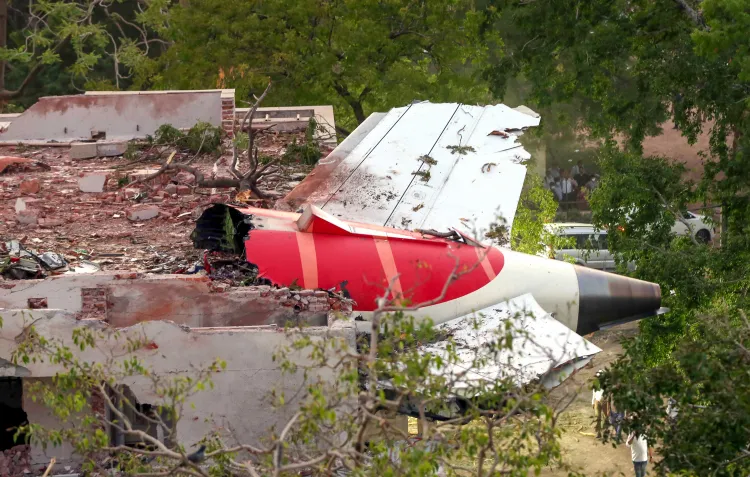What Did the AAIB Preliminary Report Reveal About the Air India Plane Crash?

Synopsis
Key Takeaways
- The AAIB's preliminary findings indicate a critical failure in fuel control switches.
- The crash resulted in 275 fatalities, sparking widespread grief.
- Air India and Boeing are committed to supporting the ongoing investigation.
- No immediate recommendations for Boeing 787-8 operators from the AAIB.
- The incident raises critical questions about aviation safety protocols.
New Delhi, July 12 (NationPress) Shortly after the Aircraft Accident Investigation Bureau (AAIB) published its preliminary findings regarding the tragic Air India plane crash in Ahmedabad, both Air India and Boeing released statements reaffirming their commitment to assist with the ongoing investigation and expressing their condolences to the victims and their families.
The AAIB's initial conclusions reveal that the Air India Boeing 787-8 aircraft's engine fuel control switches shifted from the 'RUN' to 'CUTOFF' position within three seconds of takeoff, leading to a catastrophic failure.
The aircraft went down just 34 seconds after departing from Ahmedabad airport on June 12, resulting in the deaths of 275 individuals, including passengers, crew, and people on the ground, as the plane crashed into a densely populated area and struck a doctors' hostel before exploding in flames.
Air India, in a statement on X, noted, "We stand in solidarity with the families and those affected by the AI171 incident. We continue to grieve the loss and are wholly dedicated to offering assistance during this challenging time."
The airline acknowledged receipt of the AAIB's preliminary report and added, "Air India is collaborating closely with stakeholders, including regulators. We are committed to fully cooperating with the AAIB and other authorities as their investigation unfolds."
Given the ongoing investigation, the airline declined to provide specific details about the crash and directed all inquiries to the AAIB.
Boeing also released a statement extending its condolences.
"Our thoughts are with the families of the passengers and crew on board Air India Flight 171, as well as with everyone impacted on the ground in Ahmedabad. We remain committed to supporting the investigation and assisting our customers," the company stated.
Boeing further indicated that it would defer to the AAIB for detailed updates, in accordance with the United Nations International Civil Aviation Organisation protocol known as Annex 13.
The AAIB's 15-page report highlighted that both fuel control switches supplying fuel to the engines of Air India flight 171 turned off almost simultaneously, leading to the shutdown of both engines.
One of the pilots can be heard on the cockpit voice recorder questioning the other about why he had cut off the fuel, to which the other pilot replied, "I did not."
The report stated that the flight lasted approximately 30 seconds from takeoff to crash. At this point, there are no recommended actions for operators of Boeing 787-8 aircraft and GE GEnx-1B engines.
The preliminary report also mentioned that the US Federal Aviation Administration (FAA) had issued a Special Airworthiness Information Bulletin (SAIB) in 2018 concerning the "potential disengagement of the fuel control switch locking feature."
However, Air India did not conduct the inspection as the SAIB was advisory and not mandatory.
The report concluded that there were no weather-related issues affecting the flight, and the aircraft's takeoff weight was well within permissible limits for the given conditions.
The tragic air crash resulted in nearly 270 fatalities – 241 of the 242 individuals on board and others on the ground.










